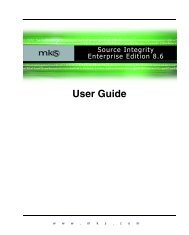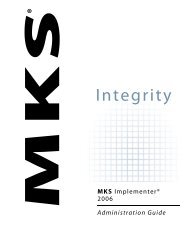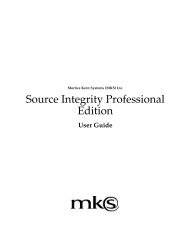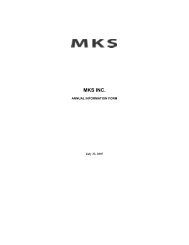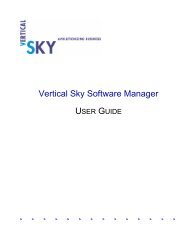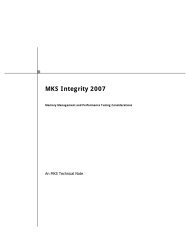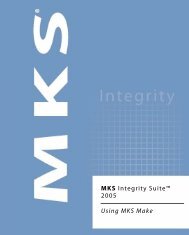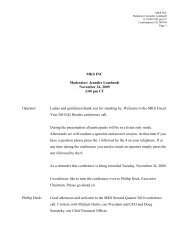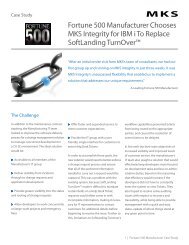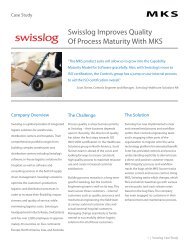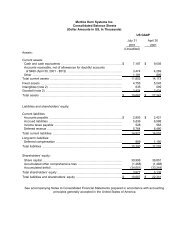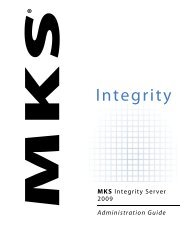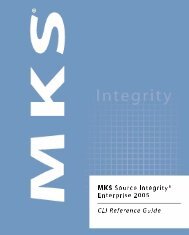Basics of the MKS Toolkit - Mks.com
Basics of the MKS Toolkit - Mks.com
Basics of the MKS Toolkit - Mks.com
Create successful ePaper yourself
Turn your PDF publications into a flip-book with our unique Google optimized e-Paper software.
For fur<strong>the</strong>r information, see<br />
<strong>the</strong> regexp reference page in<br />
<strong>the</strong> online <strong>MKS</strong> <strong>Toolkit</strong> Utilities<br />
Reference.<br />
Differences<br />
Between grep &<br />
egrep<br />
displays all <strong>the</strong> records that begin with <strong>the</strong> word Superman.<br />
egrep '00$' <strong>com</strong>ics.lst<br />
Creating Sub-Lists<br />
displays all <strong>the</strong> records that end in 00.<br />
If you want to use <strong>the</strong> literal meaning <strong>of</strong> a pattern character instead <strong>of</strong><br />
its special meaning, put a backslash (\) in front <strong>of</strong> <strong>the</strong> character. For<br />
example,<br />
egrep '\$1\.00$' <strong>com</strong>ics.lst<br />
finds all <strong>the</strong> lines that end in $1.00. If we did not put <strong>the</strong> backslash in<br />
front <strong>of</strong> <strong>the</strong> $ and ., <strong>the</strong>y would be interpreted as having special<br />
pattern meanings.<br />
<strong>MKS</strong> <strong>Toolkit</strong> accepts much more <strong>com</strong>plex patterns than <strong>the</strong> ones we<br />
have discussed here. The formal name for such a pattern is a regular<br />
expression.<br />
fgrep and egrep are collectively known as <strong>the</strong> grep <strong>com</strong>mands. In<br />
fact, <strong>the</strong> fgrep <strong>com</strong>mand is equivalent to<br />
grep -F<br />
and egrep is equivalent to<br />
grep -E<br />
If you examine <strong>the</strong> <strong>MKS</strong> <strong>Toolkit</strong> Utilities Reference, you will notice that<br />
<strong>the</strong>y are explained toge<strong>the</strong>r, on <strong>the</strong> grep reference page. It is<br />
worthwhile taking a moment to explain how <strong>the</strong> two are different,<br />
and <strong>the</strong> easiest way to do this is to take an example.<br />
fgrep '$1.00' <strong>com</strong>ics.lst<br />
will go through <strong>the</strong> <strong>com</strong>ics list file and display all <strong>the</strong> records that<br />
contain <strong>the</strong> string $1.00. However,<br />
egrep '$1.00' <strong>com</strong>ics.lst<br />
displays nothing. Why? To egrep, $ is a pattern character standing<br />
for <strong>the</strong> end <strong>of</strong> <strong>the</strong> line. Thus <strong>the</strong> egrep <strong>com</strong>mand is looking for<br />
records where 1.00 follows <strong>the</strong> end <strong>of</strong> <strong>the</strong> line. Since <strong>the</strong>re is never<br />
anything after <strong>the</strong> end <strong>of</strong> <strong>the</strong> line (<strong>the</strong> next line doesn't count), <strong>the</strong><br />
egrep <strong>com</strong>mand can never find a record that matches <strong>the</strong> pattern.<br />
The difference is <strong>the</strong>refore that fgrep always takes characters<br />
literally, while egrep gives pattern characters <strong>the</strong>ir special meanings.<br />
For simple searches, fgrep is usually easier to use than egrep,<br />
because you don't have to worry about special characters.<br />
<strong>Basics</strong> <strong>of</strong> <strong>the</strong> <strong>MKS</strong> <strong>Toolkit</strong> 23



